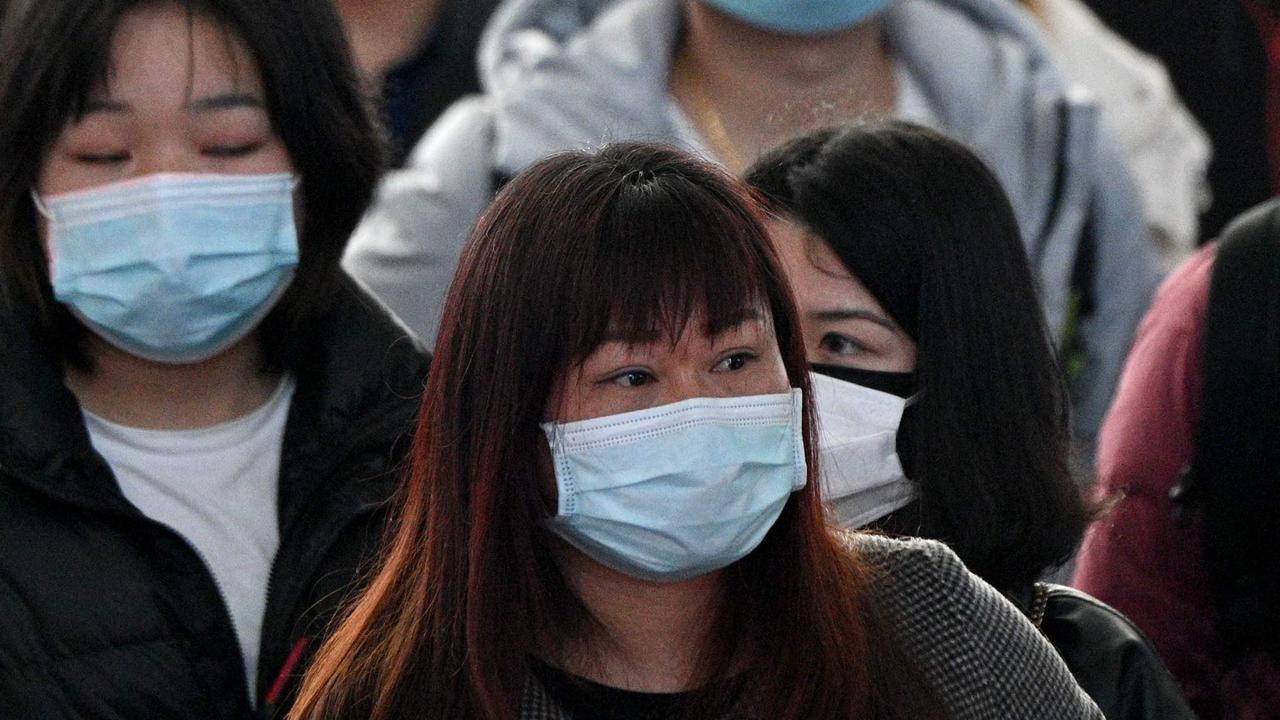
The towering skyscrapers in Changsha have stopped glowing.
The provincial capital of Hunan and home to more than 7 million people is without street lights, too.
Lifts have been switched off, forcing workers to scale dozens of flights of stairs to the office in the bitter cold.
In Yiwu, a city of 1.2 million in China’s far east, factories have slashed working hours by up to 80 per cent. When workers leave at night, the streets are dark.
The problem is two-fold. The first part of the problem is that China has emerged from the worst of COVID-19 relying heavily on electricity to fuel work through the winter which, in many parts, features temperatures below zero.
The second part of the problem is that China banned Australian coal.
The decision by Beijing in mid-December followed a months-long feud that has seen China ban exports from seafood to wine and timber.
It is linked to a list of 14 grievances China filed with Australia. At the top of the list is the Morrison Government’s calls for an independent inquiry into the origins of the coronavirus which emerged from Wuhan in early 2020 and spread worldwide.
China viewed Australia’s stance as an insult and took action. President Xi Jinping has not spoken with Prime Minister Scott Morrison since, despite repeated attempts by Australia to end the tense stand-off.
But as China enters a harsh winter, there might also be pressure from within.
The Financial Times reports dozens of Chinese cities and at least four provinces have imposed rules on electricity use that include residents and businesses cutting how much power they use.
One of China’s largest energy groups told the publication: “The import curb is enough to change the industry landscape.”
“Many local power plants depend on Australian coal due to its higher efficiency and now they are having trouble finding an alternative,” said the director of China Huadian Corporation.
The New York Times reports the ban on Australian coal is having an unexpected impact as the relationship between the two countries goes “into free-fall”.
“Australia has, among other things, demanded an investigation into the origins of the coronavirus, which first emerged in China. China in turn has banned imports of Australian coal – leaving huge ships stranded at sea,” the Times reports.
China denies the situation is being exacerbated by a ban on Australian coal but a Chinese energy insider told The Australian: “You cannot pretend that bad relations between China and Australia haven’t contributed to this situation.”
The South China Morning Post also reports that coal prices have “skyrocketed since October to a level not seen since May last year”, with a spokeswoman from China’s National Reform Development Commission stating that: “We have noticed coal prices have risen recently and that has caused widespread concern in society.”
Speaking with news.com.au earlier this month, Professor James Laurenceson, the director of the Australia-China Relations Institute at UTS, touched on the current predicament facing China and said the more restrictions that were imposed, the more Beijing risked hurting its own interest.
“For example, iron ore would hurt Australia the most, but if China hit that, it would shoot itself in the foot even more,” he said at the time.
Dr Pradeep Taneja, who lectures at the University of Melbourne on Chinese politics and international relations, told the ABC last month that China knows exactly what it is doing and that more blockades were likely to follow.
“China’s strategy is to target suppliers from Australia who are then going to make a bit of noise and it is going to stay in the news,” he said.
“I think Australia has been quite restrained. We haven’t seen any retaliation from Australia. We don’t have a trade war because it is one-sided. At the end of the day there has to be some sort of breakthrough.”
Relations reached an all-time low in late November when a Chinese government official published a doctored photo showing an Australian soldier killing an Afghan child.
The picture was used to shame Australia after a damning report alleged Australians had committed war crimes in Afghanistan.
Mr Morrison demanded an apology from Beijing, but none was forthcoming.
The Global Times, one of China’s most outspoken state media publications, wrote that China’s relationship with Australia was worsening.
“Australia has repeatedly used wrong words and deeds on issues involving China’s core interests and major concerns, which is widely regarded as the root cause of the relationship falling to its lowest point,” it wrote.
https://news.google.com/__i/rss/rd/articles/CBMioAFodHRwczovL3d3dy5uZXdzLmNvbS5hdS9maW5hbmNlL2J1c2luZXNzL21pbmluZy9jaGluYXMtYmFuLW9uLWF1c3RyYWxpYW4tZXhwb3J0cy1iYWNrZmlyZXMtYXMtY2l0eS1ibGFja291dHMtb3JkZXJlZC9uZXdzLXN0b3J5LzE0MDUyZjgzMGJlMGE0ODA4MDY4N2U2ZmI5YThlMWU10gGgAWh0dHBzOi8vYW1wLm5ld3MuY29tLmF1L2ZpbmFuY2UvYnVzaW5lc3MvbWluaW5nL2NoaW5hcy1iYW4tb24tYXVzdHJhbGlhbi1leHBvcnRzLWJhY2tmaXJlcy1hcy1jaXR5LWJsYWNrb3V0cy1vcmRlcmVkL25ld3Mtc3RvcnkvMTQwNTJmODMwYmUwYTQ4MDgwNjg3ZTZmYjlhOGUxZTU?oc=5
2020-12-22 12:07:26Z
CBMioAFodHRwczovL3d3dy5uZXdzLmNvbS5hdS9maW5hbmNlL2J1c2luZXNzL21pbmluZy9jaGluYXMtYmFuLW9uLWF1c3RyYWxpYW4tZXhwb3J0cy1iYWNrZmlyZXMtYXMtY2l0eS1ibGFja291dHMtb3JkZXJlZC9uZXdzLXN0b3J5LzE0MDUyZjgzMGJlMGE0ODA4MDY4N2U2ZmI5YThlMWU10gGgAWh0dHBzOi8vYW1wLm5ld3MuY29tLmF1L2ZpbmFuY2UvYnVzaW5lc3MvbWluaW5nL2NoaW5hcy1iYW4tb24tYXVzdHJhbGlhbi1leHBvcnRzLWJhY2tmaXJlcy1hcy1jaXR5LWJsYWNrb3V0cy1vcmRlcmVkL25ld3Mtc3RvcnkvMTQwNTJmODMwYmUwYTQ4MDgwNjg3ZTZmYjlhOGUxZTU
Bagikan Berita Ini















0 Response to "China’s ban on Australian exports backfires as city blackouts ordered - NEWS.com.au"
Post a Comment